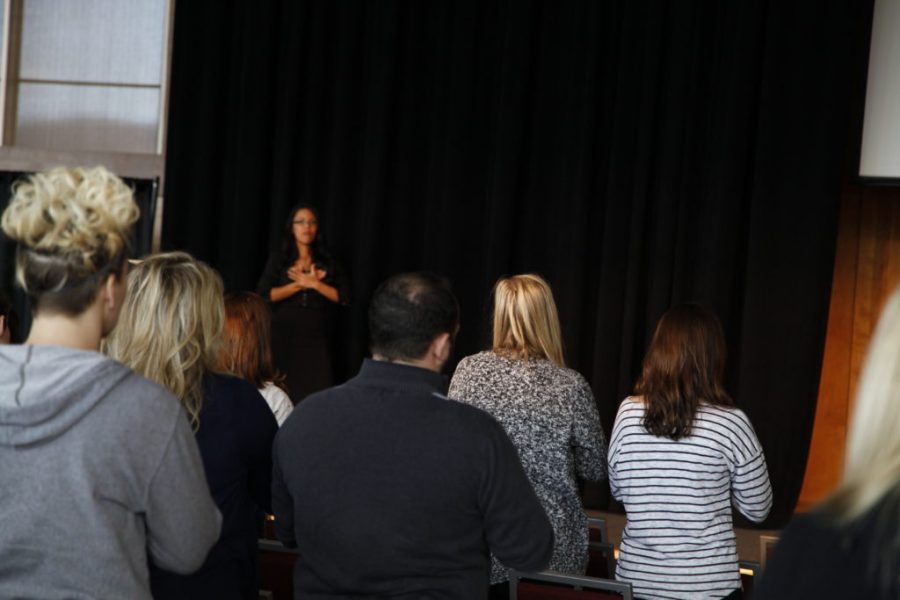I was registered for a Women’s Leadership Summit run by women, for women and about women. I had a recurring thought during and after the event: we need more men. We need more male, transgender and nonbinary people to attend future Women’s Leadership Summits because the notion that this was solely an event for women is wrong. The speeches may have been directed at a majorly female audience, but the messages were not gender specific. Also, there is the simple truth of the matter: womanhood affects us all.
Take the keynote speeches. Irene Maya Ota, academic program manager in the U’s College of Social Work, expounded on her personal narrative of being a Japanese-American woman in the 1950s and onward. Lynne Roberts, head coach for the U’s women’s basketball team, discussed the importance of grit in achieving anything in a man’s world. Lastly, Nubia Peña, advocate and attorney for the survivors of violence (sexual, domestic, etc.), encouraged self determination when deciding how to reach your most successful life.
Were these messages aimed at women in large? Yes. As a male, did I internalize these messages as well? Yes, definitely. These inspiring keynote speakers brought to the forefront of my mind issues of racism, double standards and self worth. As a male, but rather as a human, I learned more about these topics and grew as an individual for it, which is the goal of the WLS, after all.
This applied to the workshop sessions after the keynotes as well. Unfortunately, because of how the schedules were set up, attendees could only attend three of the twelve workshops. My first workshop described the patriarchy and women with impostor syndrome in the patriarchy.
After a few minutes, however, the message switched solely to self image and worth. Our workshop leader, Libia Marqueza Castro, delved into her own struggles with self confidence and by the end we were all more aware of the importance of accepting oneself. Impostor syndrome and self acceptance are not gender specific topics. I have body image issues too and I doubt my worth to others constantly. Even a New York Times article on imposter syndrome, written by a man, notes that it affects both women and men. The point is that these are important lessons that transcend gender boundaries. I was rightly distressed to see that I was one of only two men in Castro’s workshop.
Even when the talking points did not fully relate to me specifically, they would have to others. My second workshop focused on people of color and transgender womanhood. Our workshop leader, Romeo Jackson, discussed the historical and contemporary definitions of womanhood that have consistently left black women delegitimized, women of color stereotyped, and in the case of transgender women, both.
These topics do not directly affect me as a white cis-male but I see the relevance they have to our transgender and nonbinary peers. Those that feel misunderstood, misrepresented or misplaced in the gender dichotomy would have (in my best guess) felt validated and heard. Despite them not being traditionally female, this workshop in particular signified that transgender/nonbinary people should be taken into account. The event valued, overall, the transgender/nonbinary community.
My final workshop of the evening was dedicated to RBF. I decided on this workshop specifically because I had no idea what RBF stood for. I now know that it means “resting bitch face.” Led by two presenters, Romeo Jackson and Vivian D’Andrade, this workshop explored the tangible and public drawbacks of resting bitch face.
Regardless of gender, most people have a minutely contemptuous resting face. Since I was young my mother, father, family and friends would ask if I was angry, sad or annoyed at any given moment when I was merely neutral (or bored). Not surprisingly, women are called out on this phenomenon far more often than me and RBF results in heckling, harassment and in some cases violence, since RBF can sometimes seem threatening.
A recent study found that RBF is found equally among males and females: “the idea of RBF as a predominantly female phenomenon has little to do with facial physiology and more to do with social norms.” Now we know where RBF got its middle name—demeaning double standards. In point, this workshop’s message was about being cognizant of implicit biases; and part of the solution to any double standard is first to recognize it.
Cognizance is the main reason why I believe the Women’s Leadership Summit is not only for women. We have made headway over the past decades, but for all intents and purposes, America is still operating as a man’s world. Conferences and events like the WLS are intended to prepare the next generations of women to become leaders that can navigate through a system that values them below men. Women can learn grit while gritting their teeth at the system, or they can teach the rest of us to be cognizant of the struggles women face.
Women empowerment starts with our fellow females, but it does not end there. We shouldn’t be aiming to change the female generations; we should be aiming to change whole generations. All people—male, female, transgender, and nonbinary—have a stake and influence in our society. Gender equality will not come until womanhood is part of a man’s world and manhood is part of a woman’s world. Next year, I expect to see you there.



Entity • Apr 3, 2017 at 5:54 pm
Nicely said my friend